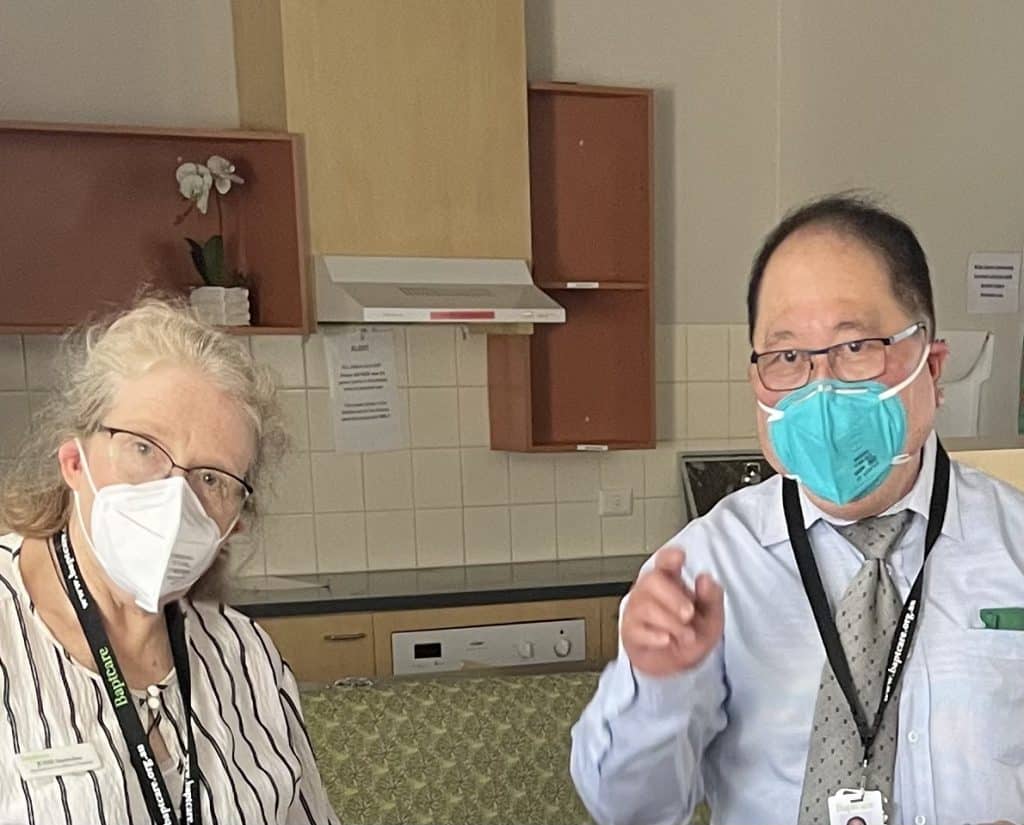
Maya Pilbrow
6 May 2023
Josephine Snowdon has been thinking about trauma for a long time.
A former occupational therapist turned full-time lay chaplain, Ms Snowdon’s career and faith have been driven by a desire to help people manage the pain in their lives.
Ms Snowdon, a full-time lay chaplain since 2016, said lay chaplains like herself were capable of supporting people in a wide variety of ways.
She has worked in hospitals as well as in disability support, social welfare programs and aged care.
Ms Snowdon said lay chaplains were called on to provide many services, including bedside prayers, helping people manage transitions of health and guiding those facing questions of faith.
She said she felt blessed to enable others spiritually but her journey to lay ministry had not been straightforward.
Ms Snowdon grew up in a non-observant Christian household. Her paternal grandfather had been an Anglican minister, and she and her siblings were all baptised, but the family didn’t go to church on Sundays.
She recalls seeing family members struggle with mental health and trauma from a young age.
As a teenager, she was invited by chance to a Scripture Union youth camp where she met likeminded young people and experienced a spiritual awakening.
She was confirmed in her faith and started getting involved with the Church Missionary Society. Around this time, she began exploring theology more, looking at the relationship between trauma and faith.
As a student she was drawn to occupational therapy, seeing it as a practical way to help those dealing with traumatic experiences.
As an OT in the 1980s and 1990s, she helped people with physical and other types of rehabilitation, working with both young children and elderly people.
Ms Snowdon said she’d always had the sense a person’s spirituality was central to how they managed their life.
This belief was unpopular at the time among mainstream OTs, she said.
“It was very ‘medical model’,” she said. “There’s often a chasm between the spiritual type of thinking and the medical type.”
In the mid-1990s a shift happened when Canadian research suggested spirituality should be incorporated into the OT model.
Ms Snowdon said these developments prompted her to begin theological, pastoral care and ministry studies. This led to her entry into chaplaincy.
Ms Snowdon said at university there was a focus was on seeking ordination. It felt as if ordination was seen as the only worthwhile endpoint of theological study. But that wasn’t what she was aiming for.
Read more: Mallacoota parish pulls together for cyclone-affected migrant workers
Ms Snowdon said she enjoyed the freedom of conducting theological research in spirituality and disability, but that she faced some difficulties in this area.
She said her background in OT gave her valuable and valid insights into people’s spirituality, especially those with disability. She said understanding spirituality in people with disability could challenge some traditional theological perspectives.
She said her view was that lay ministry was a way to provide practical outcomes and spiritual direction to people in need.
During her time working at Anglicare agency Samaritans in Newcastle she worked with staff delivering services to families in stress with children going into care, people being released from prison, people living with disability and victims of natural disasters.
However, her chaplaincy position was made redundant during a wave of cost cutting in 2021.
Ms Snowdon said more support was needed towards lay vocation. She said ordained people were often prioritised for chaplaincy positions but lay ministry was an opportunity to explore new ways of doing things, using the skills of people in the community.
Ms Snowdon said lay chaplains often needed to provide non-denominational religious services to people from different spiritual backgrounds.
Ms Snowdon said lay chaplains usually understood spirituality as broader than religion, given that many people might not have faith backgrounds. She said older people might have a matured faith that was broader than when they were young and that people with disability might have different understandings of religious concepts and perceptions of their faith.
Ms Snowdon said she was focused on her current work as a lay chaplain at an aged care residential community as well as advocating for and creating opportunities for people with disabilities to engage in parish life.
She said she did not feel being unordained was a barrier to her current work but said her commitment to the church might be less evident to others.
Nevertheless, she said her experiences in lay chaplaincy made her feel she was fulfilling her calling.
“It’s like coming home to your central self,” she said.
For more faith news, follow The Melbourne Anglican on Facebook, Twitter, or subscribe to our weekly emails.






